|
|
|
Sort Order |
|
|
|
Items / Page
|
|
|
|
|
|
|
| Srl | Item |
| 1 |
ID:
181737


|
|
|
|
|
| Summary/Abstract |
This article posits a competitive bacterial ecology as a framework for Mexican drug trafficking with a novel focus on bacterial conjugation (one type of horizontal gene transmission) to explain tactical homogenization. Individual drug traffickers consciously switch between Mexican organized crime groups sometimes three and four times, much like individual bacteria exchange their DNA in a horizontal genetic transfer that allows rapid evolution and resilience. Bacterial conjugation is a useful amplifying variable for understanding the homogenization of violence and this article probes its plausibility by providing examples of traffickers switching groups and taking tactics with them. Drawing on examples of traffickers and cells from the Arellano Felix Organization, the Sinaloa Cartel, Cartel de Jalisco Nueva Generacion, the Viagras, Zetas, and the Gulf Cartels, this article traces the genealogy of violent tactics, techniques, and procedures such as dissolving bodies in acid, asphyxiation, and infantry tactics, through individual traffickers into new groups drawn generally in the direction of more powerful, proximate, and similar trafficking groups.
|
|
|
|
|
|
|
|
|
|
|
|
|
|
|
|
| 2 |
ID:
181752
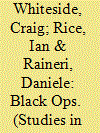

|
|
|
|
|
| Summary/Abstract |
This paper studies non-state militant group emulation and development of a special operation capability that stands in stark contrast to the normal repertoire of guerilla and terror tactics. Building on evidence of one well-documented Islamic State attack in 2012 that fit many of the criteria of a special operation, we analyzed the mission using concepts from strategic studies to understand the decision-making behind it. We then expanded our search of Islamic State operational claims looking for other examples, in order to understand the scope and frequency of Islamic State special operations since 2006. We found solid evidence of at least three Islamic State special operations over a decade: Ramadi, Iraq (2007), Haditha, Iraq (2012), and Abu Ghraib/Taji, Iraq (2013). Using these insights, we present two key levers – leadership and propaganda - used by the Islamic State in the decision-making and centralized distribution of resources to invest in a special operations capability that produced outsized strategic effects. These findings contest the conventional wisdom of the future of insurgency as decentralized structures made up of loose, leaderless networks.
|
|
|
|
|
|
|
|
|
|
|
|
|
|
|
|
| 3 |
ID:
181743
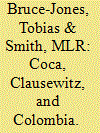

|
|
|
|
|
| Summary/Abstract |
Studies of micro-level violence make various claims to universality: namely, that there are patterns of violence in civil wars that are observable across time and space. The analysis of rebel violence against civilians constitutes one of the enduring themes of these studies. By evaluating the actions of the Revolutionary Armed Forces of Colombia (FARC) during the latter half of the Colombian civil war, this paper demonstrates that the claims of micro-level studies are unable to account for FARC’s violence against civilians. In response, this study provides an alternative framework for understanding FARC’s violence. Informed by the theories of Carl von Clausewitz it is possible to comprehend the logic of FARC’s violence against civilians within a strategic framework that aimed to advance the movement’s political goals. However, it also illustrates that FARC was influenced heavily by its involvement in the drugs trade. The main findings are a) that whilst FARC’s acts of violence may have contained similarities to that of other drugs cartels FARC did not become a narco-guerrilla organization, b) the case of FARC demonstrates that ultimately there are no reproducible patterns in war, micro-level or otherwise.
|
|
|
|
|
|
|
|
|
|
|
|
|
|
|
|
| 4 |
ID:
181734
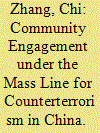

|
|
|
|
|
| Summary/Abstract |
The mass line principle offers an alternative approach to mobilize citizens to participate in governance. The key tenets of the mass line principle resemble that of the regime of community engagement, aiming at encouraging democratic participation, improving the trust between the rule and the ruled, and improving the ability of the government to gather intelligence. In the context of China’s counterterrorism strategy, the mass line involves the encouraging citizens’ participation in the People’s War on Terror, incentivizing individuals to provide tip-offs, and engaging patriotic believers, opinion leaders, grass-roots propagandists, and cultural workers to persuade and educate the masses to adopt “correct” views. In addition, the government seeks to publicize the voice of Uyghurs from within the community. However, such efforts only served as evidence for intolerance for diversity and an invitation for further suspicion and criticism. This article demonstrates the trust dilemma the state faces—in order to improve democratic participation, the efforts to engage a community and gather intelligence often result in eroding the trust. This article also highlights the importance of differentiating harmony and political conformity. Diversity per se is not the source of conflict, but it is often targeted by the state as it is desperately seeking to demonstrate efficacy in the face of terrorism.
|
|
|
|
|
|
|
|
|
|
|
|
|
|
|
|
| 5 |
ID:
181744
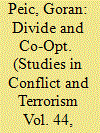

|
|
|
|
|
| Summary/Abstract |
Recent research suggests that civilian defense forces (CDFs) – a distinct type of pro-government militia – can help states suppress insurgent movements. Considering the potential benefits, it is understandable why governments would want to use them. However, viewed from the perspective of civilian recruits, militia duty is a perilous side job that pays very little. So, why do civilians sign up to serve in them? This paper argues that civilian private agendas play a major role in facilitating the recruitment of CDFs. Because private agendas are difficult to observe directly, I examine their impact indirectly by identifying tribal groups as a population segment with particularly strong private incentives stemming from intertribal feuds and the concomitant desire to gain an upper hand relative to local rivals. The argument is tested on a novel province-level data set of CDF deployments in Turkey and the Philippines. Statistical analyses of these data show that states recruit over 50 percent more CDFs in regions with even modest tribal presence than in comparable areas without any tribal populations. These findings suggest that private agendas play a significant role in motivating militia recruitment. Private agendas thus help governments to combat macro-level insurgent movements by exploiting micro-level social tensions. The research also sheds light on the makeup of recruits and points to intensification of civilian disputes as likely ramification of CDF deployment in counterinsurgency campaigns.
|
|
|
|
|
|
|
|
|
|
|
|
|
|
|
|
| 6 |
ID:
181742


|
|
|
|
|
| Summary/Abstract |
This paper argues that eudaemonic legitimation is a useful tool in understanding how insurgencies seek to justify their “effectiveness” and “performance” vis-à-vis the state in order to enhance authority and mobilise support for their strategic objectives. By examining primary FARC documents, conference and plenary findings, and select interviews with former and active FARC, ELN and M-19 members, it demonstrates how FARC constructed social contracts and integrated illicit financing into its operations as a strategy to appeal to its eudaemonic legitimation in its areas of proto-state influence, in turn aiming to mobilise support and consolidate a full-spectrum normative system. “Effectiveness” in FARC’s strategic approach through rule-setting allowed the organisation to expand to control significant portions of Colombian territory, which to a degree impacted positively on social mobilisation and challenged the government’s legitimacy by consolidating power structures in areas where there was a lack of government authority. FARC further appealed to social and economic “performance” by using revenue from its fundraising activities through engagement in the coca trade and kidnap for ransom to not only strengthen its military capacity, but also implement social initiatives and provide material goods. In turn, FARC was able to develop zones of security through the creation of social contracts in which stable economic practices were able to solidify, contributing in its effectiveness in providing proto-state authority and allowing for insurgent expansion.
|
|
|
|
|
|
|
|
|
|
|
|
|
|
|
|
| 7 |
ID:
181741


|
|
|
|
|
| Summary/Abstract |
Higher temperatures have been associated with aggression in humans, but the heat–aggression relationship has not been clearly established for terrorist attacks. We found significant and positive relationships when regressing the number of terrorist attacks and associated deaths on temperature in 159 countries from 1970 to 2015. When temperature increases, the number of terrorist attacks and deaths due to terrorist attacks tend to increase. Our results are consistent with a large body of research on the effect of climate on conflict and are of practical concern given increasing average global temperatures.
|
|
|
|
|
|
|
|
|
|
|
|
|
|
|
|
| 8 |
ID:
181747
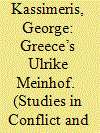

|
|
|
|
|
| Summary/Abstract |
Pola Roupa’s arrest in 2016 was the final nail in the coffin of Revolutionary Struggle, the first guerrilla group to emerge on Greece’s terrorist landscape after the 2002 collapse of 17 November, the country’s premier terrorist organisation for almost three decades and one of Europe’s longest-running terror gangs. Drawing on the judicial investigation findings, courtroom testimonies, RS communiqués and interviews with counter-terrorism officials, this article tells the story of Pola Roupa, the first female leader of a Greek terrorist group in an attempt to understand the political reasons and motivational factors that led to her involvement in terrorism. At the same time, the article hopefully contributes to the study and understanding of women and terrorism by providing an insight into the role and experience of a female militant inside Greece’s gender-conservative and overwhelmingly male-dominated armed struggle movement.
|
|
|
|
|
|
|
|
|
|
|
|
|
|
|
|
| 9 |
ID:
181751
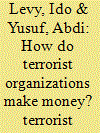

|
|
|
|
|
| Summary/Abstract |
This paper examines the funding sources of the terrorist group Harakat al-Shabaab al-Mujahideen. Using existing research and original interviews, this study outlines al-Shabaab’s history and funding sources. It theorizes that an organization’s capacity to operate in different fields of economic activity drives innovation in funding. Applying a framework for terrorist innovation to al-Shabaab’s funding sources, this study finds support for the theory. Development of intelligence and taxation capabilities is especially prevalent in the al-Shabaab context. Holding territory considerably increases organizational ability to raise funds. Increasing reliance on criminality may compromise an organization’s ideological character and leave it more vulnerable to inter-group competition.
|
|
|
|
|
|
|
|
|
|
|
|
|
|
|
|
| 10 |
ID:
181740
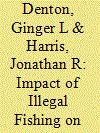

|
|
|
|
|
| Summary/Abstract |
The recent increase in maritime piracy is often associated with economic issues such as a decline in the fishing industry, but there is still no consensus on whether a decrease in local fishing causes a rise in piracy rates. We introduce the use of unreported fish catch and fishing industry type in addition to reported fish catch in Gulf of Guinea waters when analyzing factors influencing West African piracy. Using a newly released data set, which includes Illegal, Unregulated, and Unreported (IUU) fish catch by sector, we show that an increase in reported and unreported fishing yields an increase in piracy. Further, we find that increases in industrial fish catch are related to increases in maritime piracy while the opposite is true of artisanal and subsistence fish catch. We expect this new approach will highlight the impact of IUU and large-scale industrial fishing on piracy throughout the entire world.
|
|
|
|
|
|
|
|
|
|
|
|
|
|
|
|
| 11 |
ID:
181738
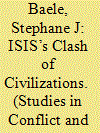

|
|
|
|
|
| Summary/Abstract |
Depictions of the West abound in the propaganda produced by the self-proclaimed “Islamic State,” presenting to potentially sympathetic audiences an overwhelmingly negative image of a supposedly homogeneous political entity. Combining quantitative and qualitative language and visual analysis, we systematically expose the various facets of this image and analyze the overall picture. Drawing on the “clash of civilizations” literature as well as on research on extremist language, we conceptualize this presentation of the West as a powerful radicalizing voice shaping today’s global civilizational politics.
|
|
|
|
|
|
|
|
|
|
|
|
|
|
|
|
| 12 |
ID:
181735
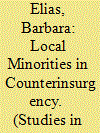

|
|
|
|
|
| Summary/Abstract |
In counterinsurgencies, minority groups such as the Sunnis in Iraq are important elements of the “population,” the social–political terrain where population-centric counterinsurgency is battled. Yet there has been little systematic analysis of minority groups in unconventional warfare and no investigation of the ways intervening forces, like the United States, have approached in-country allies in an effort to get host nations to address the strategic importance of minorities. Examining new data on alliance politics between the United States and local partners in Vietnam and Iraq, I find that while existing scholarship would suggest that in-country allies will resist U.S. pressure to engage with minority groups, local allies are surprisingly likely to comply, at least in part, in order to avoid U.S. unilateral engagement with local minorities and to influence the policies adopted. This process slowly undermines U.S. counterinsurgency efforts, speaking to the complexities of population-centric approaches and working through local proxies.
|
|
|
|
|
|
|
|
|
|
|
|
|
|
|
|
| 13 |
ID:
181746


|
|
|
|
|
| Summary/Abstract |
Scholars observe that we know little about what motivates non-state actors’ strategic interest in nuclear technology. This article argues that insurgents with ideological ambitions to form new states adopt acquisitive or destructive interests because nuclear power is a symbol of state legitimacy. State-seeking insurgents—separatists and revolutionaries—require domestic constituencies to recognize them as legitimate sovereigns. However, they differ in their need for international legitimation. Separatists’ demand for international acceptance deters them from pursuing nuclear weapons, which poses an international security threat. They will nonetheless attack the state’s nuclear facilities in areas they consider their national homeland to assert the legitimacy of their claims over these regions. Since revolutionaries do not expect international acceptance, they can pursue nuclear technology to enhance their legitimacy among key domestic audiences. Statistical analysis and qualitative examination support these hypotheses.
|
|
|
|
|
|
|
|
|
|
|
|
|
|
|
|
| 14 |
ID:
181739


|
|
|
|
|
| Summary/Abstract |
An ethos of violence based on political ideologies aiming to delegitimize an adversary is a psychosocial barrier to solving lasting conflicts, such as in Colombia. Beyond the signing of a peace agreement, the cessation of political violence implies modifying the complex symbolic dynamics constructed by various opposing actors to legitimize acts of direct violence. This research evaluates whether a new rhetoric that encourages the development of a peace culture has replaced the ideological rhetoric of various social actors involved in dialog and negotiations to end the armed conflict between the Colombian government and the Revolutionary Armed Forces of Colombia – People’s Army (FARC-EP). To this end, a textual analysis of the ideological rhetoric disseminated through Twitter® by several actors in Colombian society was conducted to identify the expressions used (semantic analysis) to legitimize or delegitimize those involved in the conflict in the last negotiation year (2016). The outcome indicates that the agenda of topics revolves around peace, and although the ideological differences between the negotiation table (i.e., the government and FARC-EP) and the opposition party are evident in the published messages, all the actors are striving to develop a rhetoric of tolerance and coexistence.
|
|
|
|
|
|
|
|
|
|
|
|
|
|
|
|
| 15 |
ID:
181750
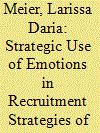

|
|
|
|
|
| Summary/Abstract |
What role do emotions play in recruitment strategies employed by armed groups? I argue that armed groups use “emotion work” – the effort to evoke or shape emotions – to recruit new fighters, trying to appeal not only to peoplès self-interest or reason but to their values and normative judgements. I use data from 30 interviews with former members of the LTTE to show that emotions were a central element of their recruitment strategy. To analyze the role of emotions in recruitment, I build on social movement theory and the sociology of emotions and propose an analytical framework linking different types of collective action frames with different emotions they provoke and the mechanisms through which they facilitate recruitment.
|
|
|
|
|
|
|
|
|
|
|
|
|
|
|
|
| 16 |
ID:
181745


|
|
|
|
|
| Summary/Abstract |
In this study we examine how grievances and social connection among Somali immigrants are associated with attitudes towards radicalization to violence. Data was drawn from structured interviews with 213 Somali young adult men living in North America. Structural Equation Modeling was used to test the association of grievances with attitudes in support of political violence, and the mediating role of social connection (ethnic community belonging, attachment to nation of residence, and social comfort seeking online). Both grievances and social connection/disconnection relate to support for political violence, but in complex ways. Findings are discussed in relation to prevention of violent extremism.
|
|
|
|
|
|
|
|
|
|
|
|
|
|
|
|
| 17 |
ID:
181749
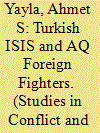

|
|
|
|
|
| Summary/Abstract |
This article attempts to establish a database of the numbers of the Turkish ISIS and AQ foreign terrorist fighters (FTFs) and their profiles through open sources, available news articles and personal interviews by the author with some former senior government officers; provides insights about the government and public perceptions on Salafi Jihadist terrorist organizations; and studies policy responses concerning returning FTFs and terrorist organizations.
|
|
|
|
|
|
|
|
|
|
|
|
|
|
|
|
| 18 |
ID:
181736


|
|
|
|
|
| Summary/Abstract |
The 2012 crisis in Mali, where the state collapsed and terrorist groups took over the north, came as a surprise to many. Mali had been considered a poster-child for democracy and was judged as considerably more stable than its neighbors by leading quantitative indices of state fragility. This article explores how quantitative risk and qualitative threat approaches led to incomplete analyses, and how bureaucratic processes stifled a holistic diagnosis of the situation in Mali. French and Dutch government views are analyzed, adding new empirical information on how ministries and embassies were unwilling to call out disconcerting developments in Mali.
|
|
|
|
|
|
|
|
|
|
|
|
|
|
|
|
| 19 |
ID:
181748


|
|
|
|
|
| Summary/Abstract |
This research examines the relationship between social control and social learning variables on involvement in violent vs. non-violent extremism. Using data from the Profiles of Individual Radicalization in the United States (PIRUS) database (n = 1,757), this study presents a series of logistic regressions. Among radicalized individuals, weaker social control and stronger social learning of violence were associated violent over non-violent behavior. These results hold across all models. Taken together, these findings support the role of control and learning theories in identifying correlates of violent and non-violent extremism and suggest the possibility of reciprocal and interaction effects for future work.
|
|
|
|
|
|
|
|
|
|
|
|
|
|
|
|
|
|
|
|
|